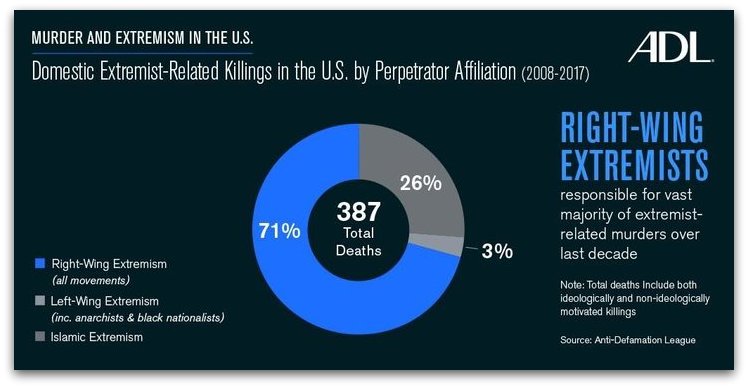 |
| Look. Where might we find the most dangerous extremists? |
Although murder by extremists represents only a tiny fraction of the overall murder rate in the U.S., “because of their nature they can have outsized impact, affecting entire communities — or even an entire country — in ways many deaths may not.”
From 2008 through 2017, right-wing extremists killed 274 people. That’s 71 percent of the 387 murders committed by extremists over the past 10 years.
“Americans do not have the luxury to ignore any extremist threat, including threats posed by white supremacists who are weaponizing social media and are more likely to take their actions into the streets,” Jonathan Greenblatt, the ADL’s CEO, said in a statement. “Their actions fuel controversy and conflict and their racist rhetoric and hateful ideas can inspire violence.”
05/2017 Right-wing extremist Jeremy Christian killed two men on a train in Portland. They were trying to stop him from harassing two teenage girls, one of whom was black and one of whom wore hijab.
The same month, Maryland student Sean Urbanski fatally stabbed Richard Collins, an African-American student at Bowie State University. Urbanski belonged to the Alt-Reich Nation group on Facebook. His computer contained evidence of his extreme racism.
12/2017 In Virginia, 17-year-old Nicholas Giampa killed his girlfriend’s parents after they had convinced her to break up with him because of his racist beliefs. He was involved in the Atomwaffen Division, a neo-Nazi group.
12/2017 In Virginia, 17-year-old Nicholas Giampa killed his girlfriend’s parents after they had convinced her to break up with him because of his racist beliefs. He was involved in the Atomwaffen Division, a neo-Nazi group.
08/2017 Right-wing extremism briefly gained national attention when more than a thousand white supremacists held a large rally in Charlottesville, Virginia. The assorted racists and fascists, perhaps emboldened by President Trump’s election, didn't hesitate to show their faces and become violent.
At the end of the rally, James Fields, a member of a far-right extremist group, drove his car into a crowd of protesters, injuring nineteen and killing one.
Afterwards, unfortunately, the president stated there were “very fine people on both sides” of the demonstration.
ISIS inspired extremists are a concern, of course. Outliers like the Vegas shooter are a concern as well. White supremacists and right-wing extremists, however, top the list today. We must recognize extremism in every context and deal with it appropriately.
Do we understand that extremism isn't necessarily an issue of race? Extremists might justify their behavior by differences of religion, race, ideology, or political perspective; it's them against everybody that doesn't agree with them.
Biased thinking spans a spectrum from reasonable out to extremes in every direction, and we may not even be aware of our own position. If we find ourselves leaning this way or that, do we do so rationally or irrationally? We perhaps should consider our answer carefully, for there are none morally right, justifiable, or virtuous, or so we're told.
 |
| Preferring one value over another is appropriate if done knowledgeably and reasonably. Outside that boundary, there is extraordinary wickedness. Without exception, extreme positions are based on partial truths. |
Do we understand that extremism isn't necessarily an issue of race? Extremists might justify their behavior by differences of religion, race, ideology, or political perspective; it's them against everybody that doesn't agree with them.
Biased thinking spans a spectrum from reasonable out to extremes in every direction, and we may not even be aware of our own position. If we find ourselves leaning this way or that, do we do so rationally or irrationally? We perhaps should consider our answer carefully, for there are none morally right, justifiable, or virtuous, or so we're told.
